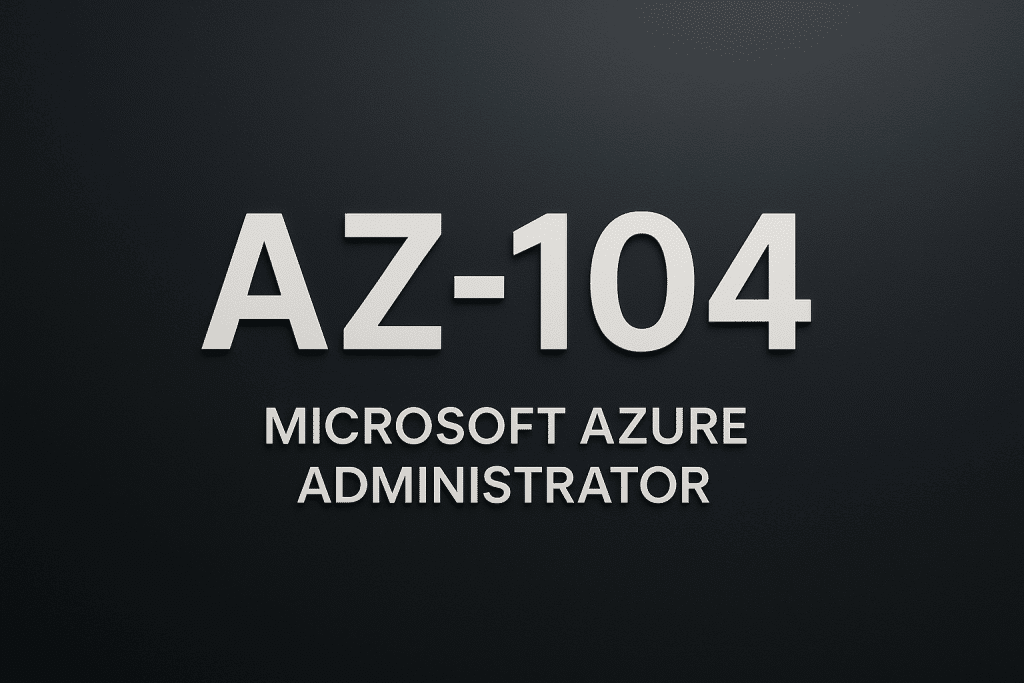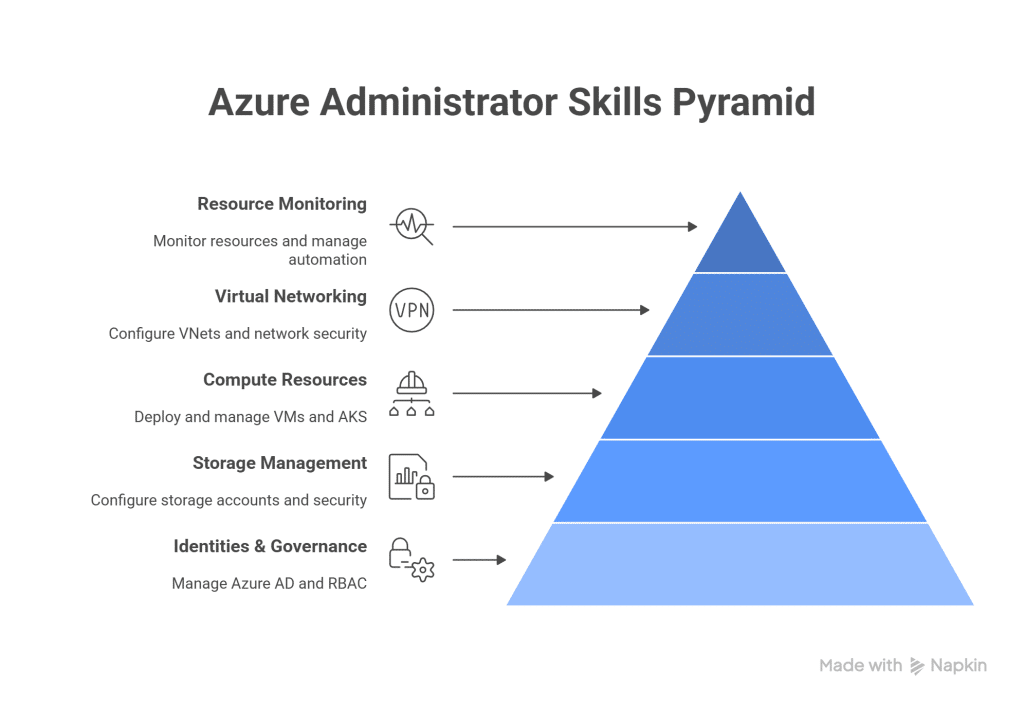
What is AZ-104?
AZ-104 is the Microsoft Certified: Azure Administrator Associate exam. It validates your ability to manage Microsoft Azure cloud services, including identity, governance, storage, compute, networking, and monitoring. Passing this exam proves that you have the practical knowledge to handle day-to-day administration tasks in Azure environments.
Who should take this exam
This exam is best suited for:
- Candidates working in hybrid environments where Azure is part of the infrastructure
- Cloud Administrators who manage Azure resources and services.
- System Administrators transitioning from on-premises infrastructure to the cloud.
- IT Professionals aiming to expand their cloud skillset.
- Developers or Engineers who need hands-on knowledge of Azure operations.
Prerequisites and recommendations
There are no mandatory prerequisites, but candidates are strongly recommended to have:
- Familiarity with PowerShell, Azure CLI, and Azure Portal.
- 6+ months of hands-on experience with Azure administration.
- Basic understanding of:
- Networking concepts (DNS, TCP/IP, VPNs).
- Virtualization and storage.
- Microsoft identity services (Active Directory, Azure AD).
Exam objectives and domains
The AZ-104 exam measures your ability across five broad skill areas:
- Manage Azure identities and governance (15–20%)
- Implement and manage storage (15–20%)
- Deploy and manage Azure compute resources (20–25%)
- Configure and manage virtual networking (20–25%)
- Monitor and maintain Azure resources (10–15%)
Objective details by domain

1. Manage Azure Identities and Governance (15–20%)
- Manage Azure Active Directory (Azure AD) objects (users, groups).
- Manage role-based access control (RBAC).
- Manage subscriptions and governance (Azure Policy, resource groups, tagging, resource locks).
2. Implement and Manage Storage (15–20%)
- Manage storage accounts and access keys.
- Configure Azure Blob Storage (tiers, lifecycle management).
- Configure Azure File shares and Azure Storage Sync.
- Secure storage using shared access signatures (SAS) and Azure AD authentication.
3. Deploy and Manage Azure Compute Resources (20–25%)
- Configure virtual machines (VMs) for Windows and Linux.
- Automate deployment using ARM templates.
- Manage VM backups, availability sets, and scale sets.
- Deploy and configure Azure App Services and container instances.
4. Configure and Manage Virtual Networking (20–25%)
- Configure virtual networks (VNets), subnets, and peering.
- Implement network security groups (NSGs) and firewalls.
- Configure Azure DNS.
- Implement load balancing and network routing.
- Set up VPNs and ExpressRoute.
5. Monitor and Maintain Azure Resources (10–15%)
- Perform routine maintenance and updates.
- Configure Azure Monitor, Log Analytics, and alerts.
- Manage backup and recovery.
- Implement resource monitoring dashboards.
What changed in this version
- Updated focus on hybrid cloud management.
- Expanded coverage of Azure governance tools like Policy and Blueprints.
- More emphasis on monitoring and automation using Azure Monitor and templates.
- Increased weight on security and compliance in cloud environments.
Registration and scheduling
- Register via Microsoft Certification Dashboard or Pearson VUE.
- Available in online proctored and test center formats.
- Flexible scheduling with global availability.
Pricing and vouchers
- Exam cost: $165 USD (may vary by region).
Discounts:
- Student discounts (academic email required).
- Microsoft enterprise voucher programs.
Vouchers may be obtained through employers or learning partners.
Policies you should know
- Reschedule/cancel at least 24 hours before the exam.
- No-show policy: failure to appear forfeits the exam fee.
- Retake policy:
- 1st fail → retake after 24 hours.
- 2nd+ fail → 14-day waiting period.
- Max 5 attempts per year.
Scoring and results
- Scored on a scale of 100–1000.
- Passing score: 700.
- Results available immediately after completion.
- Detailed score report shows strengths and weaknesses by domain.
Exam day and test experience
Duration: 120 minutes (2 hours), with 40–60 questions.
Question types include:
- Multiple choice
- Case studies
- Drag-and-drop
- Scenario-based questions
- Lab simulations
For online exams:
- ID verification before start.
- Quiet, private room required.
- Webcam and microphone needed.
Study plan and resources
Step 1: Understand the exam domains (Week 1)
- Review official Microsoft AZ-104 skills outline.
- Familiarize yourself with cloud concepts.
Step 2: Learn through official training (Weeks 2–4)
- Microsoft Learn free modules for AZ-104.
- Instructor-led training (Course: AZ-104T00).
Step 3: Hands-on practice (Weeks 3–6)
- Create a free Azure account.
- Practice tasks:
- Deploy a VM.
- Configure VNets and NSGs.
- Set up Blob Storage.
- Test monitoring with Log Analytics.
Step 4: Reinforce with study materials (Weeks 5–6)
- Use AZ-104 practice tests and dumps for self-assessment.
- Join Azure forums or study groups.
Step 5: Final revision (Week 7)
- Focus on weak domains.
- Review governance, RBAC, and monitoring.
Best Study Resources
- Community: Microsoft Tech Community, LinkedIn groups.
- Microsoft Learn: Free learning paths for AZ-104.
- Instructor-led training: Microsoft’s official AZ-104T00 course.
- Books: Exam Ref AZ-104 Microsoft Azure Administrator.
- Practice exams: Reliable providers like MeasureUp, Whizlabs, and Cert Empire dumps.
Certification validity and renewal
- Validity: 1 year from the date of passing.
- Renewal: Free online renewal assessment (at Microsoft Learn).
- Renewal must be completed before expiration.
Career outcomes
Earning the AZ-104 certification can lead to roles such as:
- Azure Administrator
- Cloud Systems Administrator
- Cloud Engineer
- Infrastructure Engineer
- IT Operations Specialist
Salary ranges vary by location, but certified Azure Administrators often earn between $80,000 – $120,000 annually.
| Job Role | Key Responsibilities | Average Salary Range (USD) |
|---|---|---|
| Azure Administrator | Manage Azure resources, configure virtual networks, handle storage accounts, monitor resources, and manage governance using RBAC and policies. | $80,000 – $110,000 |
| Cloud Systems Administrator | Oversee cloud infrastructure, ensure uptime, maintain hybrid cloud environments, and optimize cloud usage. | $75,000 – $105,000 |
| Cloud Engineer | Deploy and maintain cloud solutions, automate processes with PowerShell/CLI, ensure performance and scalability of services. | $85,000 – $115,000 |
| Infrastructure Engineer | Focus on cloud-based infrastructure, configure compute and networking, manage backups, and ensure disaster recovery. | $85,000 – $120,000 |
| IT Operations Specialist | Handle day-to-day IT operations, including identity management, monitoring, and troubleshooting Azure resources. | $70,000 – $95,000 |
| DevOps Support Engineer (entry to mid-level) | Support CI/CD pipelines, monitor cloud apps, and collaborate with DevOps teams on automation and deployments. | $80,000 – $110,000 |
Related or next-step certifications
After AZ-104, you can pursue:
- SC-300: Identity and Access Administrator Associate
- AZ-305: Azure Solutions Architect Expert
- AZ-500: Azure Security Engineer Associate
- DP-203: Data Engineer Associate
How this exam compares to similar certifications
- AZ-900 (Fundamentals) → Beginner-friendly, broad overview of Azure.
- AZ-104 (Administrator) → Hands-on, real-world Azure administration tasks.
- AZ-305 (Architect) → Higher-level, design and solution-focused.
- AWS SysOps Administrator → Similar to AZ-104 but for Amazon Web Services.
- Google Cloud Associate Engineer → Equivalent entry-level role for GCP.
Want to ace your AZ-104 exam on the first try? Get the most reliable and updated AZ-104 dumps from Cert Empire. Practice with real exam questions, boost your confidence, and pass with ease.
Frequently Asked Questions (FAQs)
Is AZ-104 difficult?
The AZ-104 exam can be challenging, especially if you are new to Azure. However, with consistent hands-on practice and structured study, it’s very manageable. Most candidates with around 6 months of Azure experience can prepare thoroughly in 6–8 weeks and pass the exam confidently.
Can beginners take AZ-104?
Yes, beginners can take AZ-104, but it’s not the ideal starting point. If you are completely new to cloud computing, it’s better to start with AZ-900: Microsoft Azure Fundamentals to build a strong foundation. Once you’re comfortable with the basics, moving to AZ-104 will be much easier.
How many attempts are allowed?
You can attempt the AZ-104 exam up to 5 times in a year. If you fail on the first attempt, you must wait at least 24 hours before retaking. After the second attempt, the waiting period increases to 14 days for each subsequent try.
Do I need coding experience?
No, coding is not a requirement for AZ-104. The exam focuses more on administration, configuration, and management tasks rather than software development. However, being familiar with PowerShell, Azure CLI, and JSON templates can give you an advantage in managing resources and automating tasks.
Can I renew this certification for free?
Yes, the AZ-104 certification is valid for one year, and Microsoft offers a free online renewal assessment. You can take this assessment through Microsoft Learn before your certification expires, and once you pass, your certification is extended for another year.


